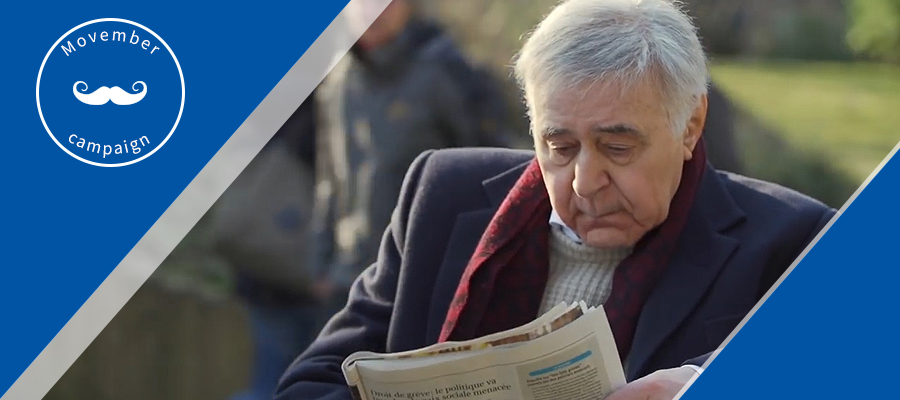Surviving cancer: what is the future?
23 Nov 2017
In 1999, Julian aged 65, was diagnosed with prostate cancer. After his operation, he took part in an EORTC clinical trial evaluating post-operative therapies that had fewer side effects. Watch him tell his story…
Over 50% of European patients diagnosed with cancer survive five years or longer after primary diagnosis. However, research has shown that health-related concerns can persist even decades after initial treatment. During the last 10 years, multiple studies have dealt with these aspects of cancer survivorship.
New therapeutic strategies are increasingly more expensive; therefore, healthcare services are evaluating, more carefully, the cost effectiveness of cancer treatment. However, costs, related to adverse health outcomes in long-term survivors, are rarely accounted for in the overall cost of healthcare. This is mainly due to the lack of information after cancer treatment. A number of initiatives have been implemented using populations registries to gather information about cancer survivors. In some countries, cancer registries have been recording the causes of hospitalizations, work force participation or post-cancer fertility. Such studies are mainly performed in the Scandinavian countries where such registries are available. In other countries only selected cohorts of the population have been evaluated, of which studies are based on selected malignancies (for example, breast cancer or prostate cancer) and allowing limited comparisons between cancer types.
EORTC has established the YOU (Your Outcome Update) Protocol in recognition of the lack of a holistic approach on long-term outcome research for medical, psychological as well as socio-economic consequences of cancer and its treatment. It believes that fragmented research endeavours lead to repetitive data collection, resulting in wastage of resources and adding unnecessary burden to survivors. There are regulatory hurdles in long-term data collection beyond the clinical trial period and a lack of prospective planning of long-term outcome research in the regulatory approval process.
The YOU protocol aims to establish an innovative data collection methodology and an operational framework to obtain long-term medical, psychological and socio-economic outcomes of patients treated in clinical trials, either from EORTC or collaborative groups; it will establish an EORTC long-term outcome data repository—the YOU data Repository.
Complementary to this process, YOU will enable to back track patients in population-based registries in case of lost-to-follow up in the clinical trial; ultimately building up a ‘dynamic ‘survivor cohort which fosters international joint long-term outcome research.
“EORTC has been standing in the frontier for the evolution of anticancer treatment thus holding the best position to evaluate treatment-related outcomes,” said Dr Lifang Liu, Study Coordinator of YOU Protocol. “The protocol enables an ideal mechanism to monitor patient outcomes beyond treatment until the end of life. It is a unique infrastructure to foster innovative, transversal and sustainable outcome research in Europe and beyond!”
For Julian, the prospect of surviving prostate cancer was daunting but with the effective treatment and management of his disease, survival has been a reality. As more cancer patients overcome their disease, the next hurdles they face relate to trying to resume a normal life, which is going back to work, obtaining financial services and health insurance. The 3rd EORTC Survivorship Summit, hosted in Brussels on 1-2 March 2018 will discuss in more depth these societal issues.
“EORTC created a survivorship research programme to understand better the long term outcomes of a cancer patient,” said Professor Françoise Meunier, Director of Special Projects at EORTC, Founder and Chair of 3rd EORTC Survivorship Summit. “Through the Summit, we create awareness regarding the societal issues. It seems that an optimal legal framework to tackle the financial burden should be developed throughout Europe, based on the new French law “droit à l’oubli”. In order to create this framework, all stakeholders including banks and insurance companies should participate in these discussions.”
For more information about the 3rd EORTC Survivorship Summit.
Please view the TEDx from Professor Françoise Meunier presenting cancer survivorship.
Related News
EORTC: Advancing research and treatment for rare cancers
29 Feb 2024
EORTC Fellowship Programme: celebrating more than 20 years of impactful collaboration
22 Feb 2024
Appointment of Malte Peters as EORTC Strategic Alliance Officer
9 Feb 2024
Unique series of workshops in partnership with the European Medicines Agency (EMA)
7 Feb 2024
EORTC launches a prominent clinical trial in older patients with locally advanced (LA) HNSCC (Head and Neck Squamous Cell Carcinoma)
14 Dec 2023
Seven IMMUcan abstracts selected for ESMO Immuno-Oncology Congress 2023
6 Dec 2023
EORTC Quality of Life measures integrated in CDISC
20 Nov 2023
EORTC and Immunocore are collaborating to launch the ATOM clinical trial of tebentafusp in Adjuvant Uveal Melanoma
7 Nov 2023
Treatment with decitabine resulted in a similar survival and fewer adverse events compared with conventional chemotherapy in older fit patients with acute myeloid leukaemia
31 Oct 2023
New results and forthcoming EORTC trials in rare cancers, lung, head and neck, and breast carcinomas presented at ESMO 2023
20 Oct 2023


